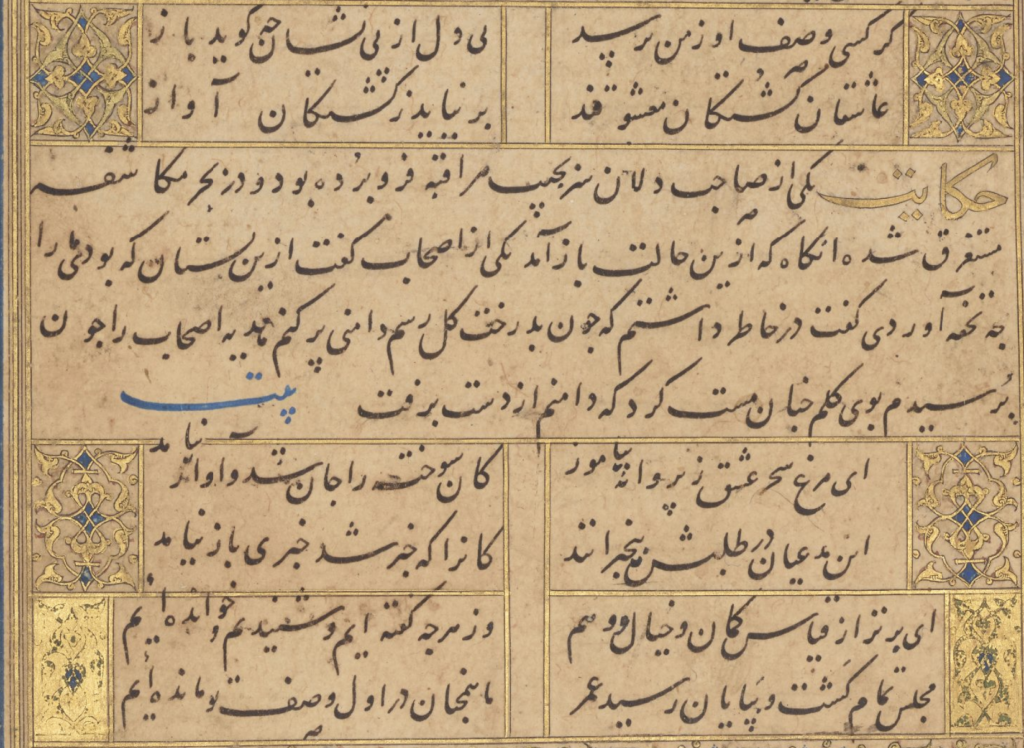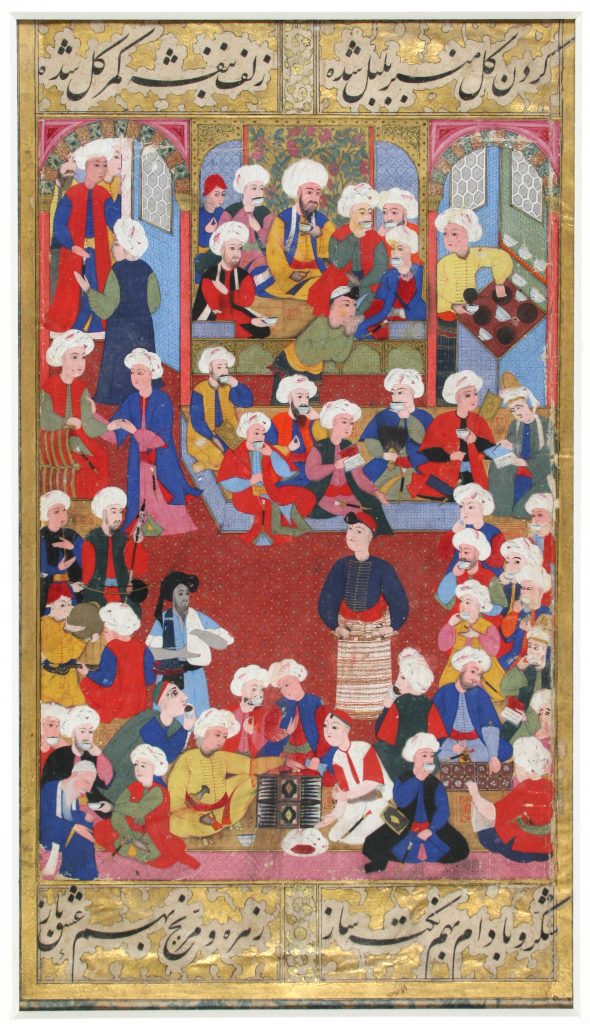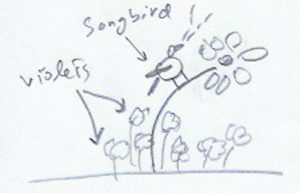See Also
Tafsir Subhan
سُبْحانَ اللهِ renders several components to experiential texture of an extremely personal and up-close feeling namely the Presence of Allah:
- Free of Defects: Allah free of all defects and foulness and weakness and so on; distanced from faults
- Amazement ( العُجْبْ ) and bewilderment about His/ITs Beauty; distanced from ordinary
- Free of Associations: Allah free and above all else i.e. sanctification e.g. free of mate and children and companions; distanced from associates
List below has all the occurrences of Subhan in Qur’an categorized according to the three categories above, mind you these categories do overlap and others maybe unearthed by your own unique experiences:
Amazement ( العُجْبْ )
What does Amazement ( العُجْبْ ) mean?
Mood: Imagine you are flying over a rarely seen and astonishing landscape of nature and for that very few moments, you experience out of body bewilderment i.e. you lose your self into this amazing observation and suddenly you snap back and gain your composure. That is the texture of the experience called Amazement ( العُجْبْ ).
If you read the verses below, if I read the verses below, and did not experience such mood then we did not read anything from Allah!?
36:83. Subhan (Amazement) for That Which (Allah) at Whose Hand (power) the dominion over all objects!!!
فَسُبْحَانَ الَّذِي بِيَدِهِ مَلَكُوتُ كُلِّ شَيْءٍ
One entity who at every moment of time and in every locality and at every process and at every object exerts ITs mastery and support to maintain the multiverse.
سُبْحَانَ اللَّهِ رَبِّ الْعَالَمِينَ
27:8. Subhan (Amazement) for the Sustainer of the Infinite Multiverses!!!
الْعَالَمِينَ
نَ
Fat-ha of Nun indicates Plethora attribute of the multiverse or in modern English language Infiniteness.
Most amazing, that Allah feeds and powers and cares for infinite universes at all times without any tiring or interruption of support.
2:32. They said: Subhan (Amazement) for Ka (You, Allah), we have no knowledge other than what you taught us
قَالُواْ سُبْحَانَكَ لاَ عِلْمَ لَنَا إِلاَّ مَا عَلَّمْتَنَا
Angels professing how incredible and amazing Allah’s knowledge is! That they only know what Allah taught them.
30:17. Subhan (Amazement) for Allah when you enter upon the evening hours, and when you rise at mourning!!!
فَسُبْحَانَ اللَّهِ حِينَ تُمْسُونَ وَحِينَ تُصْبِحُونَ
Amazement for Allah for putting into place robust systemic periodic activities and systemic periodic respite and at each period we are astonished by Allah’s masterful designs and we are bewildered by Allah’s Beauty reflected by such exquisite systems.
36:36. Subhan (Amazement) for That Which (Allah) created similars in whatever earth produces, in mankind and what (else) they have no knowledge about!!!
سُبْحَانَ الَّذِي خَلَقَ الْأَزْوَاجَ كُلَّهَا مِمَّا تُنبِتُ الْأَرْضُ وَمِنْ أَنفُسِهِمْ وَمِمَّا لَا يَعْلَمُونَ
Allah a Singleton Existence has no similars! While from That nonpareil-One came all things similar to each other e.g. humans quite similar to each other and to animals to plants. Particles/compounds of all kinds similar to each other. Processes of nature all similar to each other!
Then how from the most dis-Similar entity came such similarities!!??
Amazing!!!
34:41. Subhan (Amazement) for Ka (You, Allah) , You are most near to us, not they!
قَالُوا سُبْحَانَكَ أَنتَ وَلِيُّنَا مِن دُونِهِم
In the day of Judgement Allah resurrects regenerates all from this Earth and then directs a question to the angels “Did these people used to worship you?”.
Mood: At this time the angels are awe-stricken and immersed in the beauty of Allah not conscious of anything else, so to say, and suddenly the direct question startles them to the reality of the situation at hand i.e. the judgement.
They suddenly come back to their senses, so to say, and without any volition they say: O Most Beautiful Adorable One! How could we worship these creatures, all the while you were so close to us and we drunken in Your Beauty!? And amazingly You know of everything we do or say or know… no way we worshiped these!
43:13. Subhan (Amazement) for That Which made serviceable to us this (animal or any transportation) that otherwise we could not have mastered
سُبْحانَ الَّذِي سَخَّرَ لَنَا هَذَا وَمَا كُنَّا لَهُ مُقْرِنِينَ
A first time rider in a car, or airplane or seaworthy vessel or on the back of an animal the rider is absolutely impressed beyond any words how humans could have tamed and used these metals or animals for transportation!
I used to frequent a stable where horses and donkeys were kept and was amazed at the size and power of these mighty beasts and yet a nine year old girl could mount a gigantic horse with little effort and the animal was attentive to her safety and every slight command!
And then I remembered this verse and that feel of amazement is Subhan for That Which I cannot see! But IT/He amazes me in absentia!
10:10. Their call, in that place/state, Subhan (Amazement) for Ka (You) my Sustainer … and the last of their call indeed Hamd-u (Adoration, Gratitude) for the Sustainer of Infinite Multiverses!
دَعْوَاهُمْ فِيهَا سُبْحَانَكَ اللَّهُمَّ وَتَحِيَّتُهُمْ فِيهَا سَلاَمٌ وَآخِرُ دَعْوَاهُمْ أَنِ الْحَمْدُ لِلّهِ رَبِّ الْعَالَمِينَ
This is the rendition of the people in the Gardens of Eden face to face with Beauty of Allah while they are utterly self-absorbed in observing The Beautiful One, no thoughts no words, in complete shock, and in that sate in that place all could they give out is a call Subhan for You my Lord indeed Amazing my Lord how beautiful You are!
And the call ends with a note of gratitude Hamd since multitudes of other humans could not afford seeing That Beauty, only this minority were able to have eyes to see the Divine Light of Allah’s radiant Beauty.
And the fortunate ones at that place in that state have no business with others thus saying Peace! for we are entirely engrossed in Beauty of our Sustainer and leaving all others alone.
17:1. Subhan (Amazement) for That Which transported in the night ITs/His servant (Muhammad) from Masjid Al-Haram (Makka) to Masjid Al-Aqsa (Jerusalem)!
سُبْحَانَ الَّذِي أَسْرَى بِعَبْدِهِ لَيْلاً مِّنَ الْمَسْجِدِ الْحَرَامِ إِلَى الْمَسْجِدِ الأَقْصَى
Rapid transportation, so amazing without any crafted vehicles testament to Allah’s Amazing Presence.
17:108. And they say: Subhan (Amazement) for our Lord, Verily, our Sustainer’s promise has been fulfilled!
وَيَقُولُونَ سُبْحَانَ رَبِّنَا إِن كَانَ وَعْدُ رَبِّنَا لَمَفْعُولاً
Free of Blame
68:29. They said Subhan (Free of blame) is our Lord indeed we are the transgressors
قَالُوا سُبْحَانَ رَبِّنَا إِنَّا كُنَّا ظَالِمِينَ
7:143. And when Moses came at the time set by Us, and his Sustainer spoke unto him, he said: “O my Sustainer! Show Yourself unto me, so that I might behold You!” Said (Allah): “Never ca you see Me. However, behold this mountain: if it remains firm in its place,the you will see Me. And as soon as his Sustainer revealed ITs/His glory to the mountain, IT/He caused it to crumble to dust; and Moses fell down in a swoon. And when he came to himself, he said: “Subhan (Free of blame) Ka (You)! Unto You I do turn in repentance
وَلَمَّا جَاء مُوسَى لِمِيقَاتِنَا وَكَلَّمَهُ رَبُّهُ قَالَ رَبِّ أَرِنِي أَنظُرْ إِلَيْكَ قَالَ لَن تَرَانِي وَلَـكِنِ انظُرْ إِلَى الْجَبَلِ فَإِنِ اسْتَقَرَّ مَكَانَهُ فَسَوْفَ تَرَانِي فَلَمَّا تَجَلَّى رَبُّهُ لِلْجَبَلِ جَعَلَهُ دَكًّا وَخَرَّ موسَى صَعِقًا فَلَمَّا أَفَاقَ قَالَ سُبْحَانَكَ تُبْتُ إِلَيْكَ
Moses, peace be upon, asks to see Allah in person. Allah shows him why he cannot see IT/Him and during this explanation the mountain shakes or explodes and Moses swoons. Upon recovery Moses is quick to absolves Allah of any blame or defect for what happened and blames himself and finds defects in his own Self by asking such inappropriate questions and thus asks Allah to accept his repentance.
Free of Associations
5:116. God said: O Jesus, son of Mary! Didst thou say unto men, `Worship me and my mother as deities beside Allah’?” [Jesus] answered: Subhan (Free of Associations) (are) Ka (You, Allah)
وَإِذْ قَالَ اللّهُ يَا عِيسَى ابْنَ مَرْيَمَ أَأَنتَ قُلتَ لِلنَّاسِ اتَّخِذُونِي وَأُمِّيَ إِلَـهَيْنِ مِن دُونِ اللّهِ قَالَ سُبْحَانَكَ
30:40. Subhan (Free of Associations) (is) IT/He the Lofty, associations they ascribe to IT/Him (idols, children…)
سُبْحَانَهُ وَتَعَالَى عَمَّا يُشْرِكُونَ
37:159. Subhan (Free of Associations) (is) Allah, associations they have IT/Him characterized by (Trinity, having gender, sleeps, has died…)
سُبْحَانَ اللَّهِ عَمَّا يَصِفُونَ
39:67. Subhan (Free of Associations) (is) IT/He the Lofty, associations they ascribe to IT/Him (idols, children…)
سُبْحَانَهُ وَتَعَالَى عَمَّا يُشْرِكُونَ
59:23. Subhan (Free of Associations) (is) Allah, associations they ascribe to IT/Him (idols, children…)
سُبْحَانَ اللَّهِ عَمَّا يُشْرِكُونَ
9:31. Subhan (Free of Associations) (is) IT/He, associations they ascribe to IT/Him (idols, children…)
سُبْحَانَهُ عَمَّا يُشْرِكُونَ
Ascribing daughters and what not to Allah
37:180. Subhan (Free of Associations) (is) your Lord, Mighty Lord, associations they have IT/Him characterized by (Being father of daughters …)
سُبْحَانَ رَبِّكَ رَبِّ الْعِزَّةِ عَمَّا يَصِفُونَ
17:43. Subhan (Free of Associations) (is) IT/He the Lofty, associations they ascribe to IT/Him (idols, children…) in their speeches
سُبْحَانَهُ وَتَعَالَى عَمَّا يَقُولُونَ
19:35. Un-befitting for Allah to take/rear/adopt any child, Subhan (Free of Associations) (is) IT/He
مَا كَانَ لِلَّهِ أَن يَتَّخِذَ مِن وَلَدٍ سُبْحَانَهُ
39:4. Had Allah wished to take any child, could have chosen any member of creation IT has created as IT wished, Subhan (Free of Associations) (is) IT/He, The Allah, The Al-Wahid (One) and The Al-Qahhar (The Subjugator)
لَوْ أَرَادَ اللَّهُ أَنْ يَتَّخِذَ وَلَدًا لَّاصْطَفَى مِمَّا يَخْلُقُ مَا يَشَاء سُبْحَانَهُ هُوَ اللَّهُ الْوَاحِدُ الْقَهَّارُ
The Al-Qahhar (The Subjugator) Divine Attribute is mentioned since Allah could force any member of the creation to be ITs/Child! Does not need to wait for some guy decide that for Allah!? How wrong and arrogant of us.
6:100. They ascribed associates of Jin (Cloacked Beings) while Allah created them (Jin) yet they invented sons and daughters for IT/Him without any knowledge,Subhan (Free of Associations) (is) IT/He the Lofty, associations they ascribe to IT/Him (children…)
وَجَعَلُواْ لِلّهِ شُرَكَاء الْجِنَّ وَخَلَقَهُمْ وَخَرَقُواْ لَهُ بَنِينَ وَبَنَاتٍ بِغَيْرِ عِلْمٍ سُبْحَانَهُ وَتَعَالَى عَمَّا يَصِفُونَ
23:91. Never did Allah take unto ITself/Himself any offspring, nor has there ever been any deity side by side with IT/Him: each deity would surely have stood apart [from the others] in whatever it had created, and they would surely have [tried to] overcome one another! Subhan (Free of Associations) (is) Allah, associations they have IT/Him characterized by (Being parent…)
مَا اتَّخَذَ اللَّهُ مِن وَلَدٍ وَمَا كَانَ مَعَهُ مِنْ إِلَهٍ إِذًا لَّذَهَبَ كُلُّ إِلَهٍ بِمَا خَلَقَ وَلَعَلَا بَعْضُهُمْ عَلَى بَعْضٍ سُبْحَانَ اللَّهِ عَمَّا يَصِفُونَ
16:57. And they associate to Allah girls, Subhan (Free of Associations) (is) IT/Him
وَيَجْعَلُونَ لِلّهِ الْبَنَاتِ سُبْحَانَهُ
21:26. And they said Al-Rahman (Most Benevolent) took a child, Subhan (Free of Associations) (is) IT/Him
وَقَالُوا اتَّخَذَ الرَّحْمَنُ وَلَدًا سُبْحَانَهُ
2:116. And they said Allah took a child, Subhan (Free of Associations) (is) IT/Him
وَقَالُواْ اتَّخَذَ اللّهُ وَلَدًا سُبْحَانَهُ
21:22. Had there been in heaven or on earth any deities other than Allah, both [those realms] would surely have fallen into ruin! Subhan (Free of Associations) (is) Allah the Lord of the Throne (‘Arsh), associations they have IT/Him characterized by (Being more than one…)
لَوْ كَانَ فِيهِمَا آلِهَةٌ إِلَّا اللَّهُ لَفَسَدَتَا فَسُبْحَانَ اللَّهِ رَبِّ الْعَرْشِ عَمَّا يَصِفُونَ
28:68. And Your Sustainer creates whatever IT/He wills; and IT/He chooses [for mankind] whatever is best for them. Subhan (Free of Associations) (is) IT/He the Lofty, associations they ascribe to IT/Him (idols, children…)
وَرَبُّكَ يَخْلُقُ مَا يَشَاء وَيَخْتَارُ مَا كَانَ لَهُمُ الْخِيَرَةُ سُبْحَانَ اللَّهِ وَتَعَالَى عَمَّا يُشْرِكُونَ
43:82.Subhan (Free of Associations) (is) the Lord of heavens and the earth the Lord of the Throne (‘Arsh), associations they have IT/Him characterized by (Being more than one…)
سُبْحَانَ رَبِّ السَّمَاوَاتِ وَالْأَرْضِ رَبِّ الْعَرْشِ عَمَّا يَصِفُونَ
25:18. They said Subhan (Free of Associations) (are) Ka (You, Allah) , it is not fitting for us to take close benefactors other than You!
قَالُوا سُبْحَانَكَ مَا كَانَ يَنبَغِي لَنَا أَن نَّتَّخِذَ مِن دُونِكَ مِنْ أَوْلِيَاء
10:68. And they said Allah took a child, Subhan (Free of Associations) (is) IT/Him
قَالُواْ اتَّخَذَ اللّهُ وَلَدًا سُبْحَانَهُ
12:108.Subhan(Free of Associations) (is) Allah and I am not one of the polytheists
سُبْحَانَ اللّهِ وَمَا أَنَاْ مِنَ الْمُشْرِكِينَ
4:171. Exclusively only Allah is a Singleton Deity, Subhan(Free of Associations) (is) IT/Him
إِنَّمَا اللّهُ إِلَـهٌ وَاحِدٌ سُبْحَانَهُ
Free of Defects
3:191. … And they think about the creation of the heavens and the Earth (saying) Our Sustainer You did not create this in vain, Subhan(Free of Defects) are Ka (You, Allah)
وَيَتَفَكَّرُونَ فِي خَلْقِ السَّمَاوَاتِ وَالأَرْضِ رَبَّنَا مَا خَلَقْتَ هَذا بَاطِلاً سُبْحَانَكَ
24:16. And why do you not say, whenever you hear such [a rumour], “It does not behove us to speak of this, Subhan (Free of Defects) are Ka (You, Allah), this is an awesome calumny
وَلَوْلَا إِذْ سَمِعْتُمُوهُ قُلْتُم مَّا يَكُونُ لَنَا أَن نَّتَكَلَّمَ بِهَذَا سُبْحَانَكَ هَذَا بُهْتَانٌ عَظِيمٌ
The accusation is so laiden with perversion and criminal intent that Subhan verbiage is used to declare Allah free of any such defects since the listener of the lie feels the Presence of Allah is tainted by such foul language and says Subhan to indicate that we could not use such defective language with such defective characters in Presence of the One who has no defects!
17:93. Or you have a house [made] of gold, or thou ascend to heaven – but nay, we would not [even] believe in your ascension unless thou bring down to us [from heaven] a writing which we [ourselves] could read! Say you, [O Prophet:] Subhan (Free of Defects) (is) my Lord, aren’t I only a mere human messenger?
أَوْ يَكُونَ لَكَ بَيْتٌ مِّن زُخْرُفٍ أَوْ تَرْقَى فِي السَّمَاء وَلَن نُّؤْمِنَ لِرُقِيِّكَ حَتَّى تُنَزِّلَ عَلَيْنَا كِتَابًا نَّقْرَؤُهُ قُلْ سُبْحَانَ رَبِّي هَلْ كُنتُ إَلاَّ بَشَرًا رَّسُولاً
People are chastising the Prophet peace be upon that what kind of God he is worship who cannot give him anything (Prophet lived as a poor person). Prophet then replies: my Lord is Subhan (Free of Defects)… defects are with me and with you all…
© 2020-2002, Dara O Shayda








